Recreation: Understanding the Importance of Leisure Activities
Recreation refers to the activities that individuals engage in during their free time to relax, rejuvenate, and entertain themselves. These activities are not only enjoyable but also play a crucial role in promoting physical, mental, and emotional well-being.
Types of Recreation:
- Outdoor Recreation: Activities such as hiking, camping, fishing, and cycling that take place in natural environments.
- Indoor Recreation: Activities such as board games, puzzles, and indoor sports that can be enjoyed within the confines of a building.
- Active Recreation: Physical activities like swimming, playing sports, or dancing that promote fitness and health.
- Passive Recreation: Relaxing activities like reading, gardening, or birdwatching that help reduce stress and promote mental well-being.
Importance of Recreation:
Recreation is essential for maintaining a healthy balance in life. It offers numerous benefits, including:
- Physical Health: Engaging in recreational activities helps improve physical fitness, stamina, and overall health.
- Mental Well-being: Recreation provides an opportunity to reduce stress, enhance mood, and boost mental clarity.
- Social Interaction: Participating in recreational activities allows individuals to connect with others, fostering friendships and a sense of community.
- Skill Development: Many recreational activities provide opportunities for learning new skills and talents.
Study Guide:
As you study the topic of recreation, consider the following questions:
- What are the different types of recreational activities?
- How does recreation contribute to physical health?
- What are some examples of indoor and outdoor recreational activities?
- Why is it important to incorporate recreation into our daily lives?
- How does recreation benefit mental well-being?
By understanding the importance of recreation and the various forms it can take, you can make informed choices about how to incorporate leisure activities into your life to promote overall well-being.
.◂Science Worksheets and Study Guides Fourth Grade. Invertebrates - Animals without Backbones
Study Guide Invertebrates - Animals without Backbones
Invertebrates - Animals without Backbones  Activity Lesson
Activity Lesson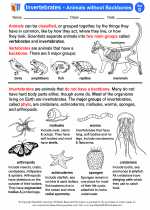 Invertebrates - Animals without Backbones
Invertebrates - Animals without Backbones  Worksheet/Answer key
Worksheet/Answer key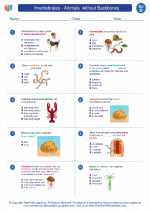 Invertebrates - Animals without Backbones
Invertebrates - Animals without Backbones  Worksheet/Answer key
Worksheet/Answer key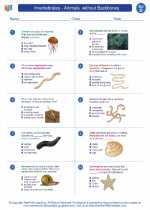 Invertebrates - Animals without Backbones
Invertebrates - Animals without Backbones  Worksheet/Answer key
Worksheet/Answer key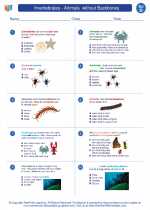 Invertebrates - Animals without Backbones
Invertebrates - Animals without Backbones  Worksheet/Answer key
Worksheet/Answer key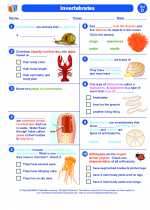 Invertebrates
Invertebrates  Vocabulary/Answer key
Vocabulary/Answer key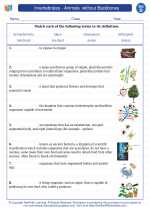 Invertebrates - Animals without Backbones
Invertebrates - Animals without Backbones  Vocabulary/Answer key
Vocabulary/Answer key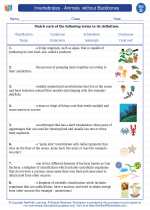 Invertebrates - Animals without Backbones
Invertebrates - Animals without Backbones  Vocabulary/Answer key
Vocabulary/Answer key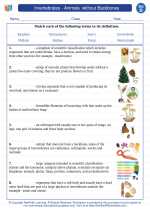 Invertebrates - Animals without Backbones
Invertebrates - Animals without Backbones  Vocabulary/Answer key
Vocabulary/Answer key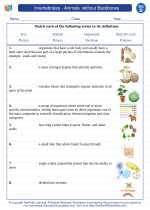 Invertebrates - Animals without Backbones
Invertebrates - Animals without Backbones  Vocabulary/Answer key
Vocabulary/Answer key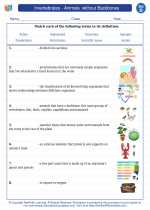 Invertebrates - Animals without Backbones
Invertebrates - Animals without Backbones 

 Activity Lesson
Activity Lesson
 Worksheet/Answer key
Worksheet/Answer key
 Worksheet/Answer key
Worksheet/Answer key
 Worksheet/Answer key
Worksheet/Answer key
 Worksheet/Answer key
Worksheet/Answer key
 Vocabulary/Answer key
Vocabulary/Answer key
 Vocabulary/Answer key
Vocabulary/Answer key
 Vocabulary/Answer key
Vocabulary/Answer key
 Vocabulary/Answer key
Vocabulary/Answer key
 Vocabulary/Answer key
Vocabulary/Answer key

The resources above cover the following skills:
Life Science: The students will use scientific skills and processes to explain the dynamic nature of living things, their interactions, and the results from the interactions that occur over time.
Diversity of Life: Explain how animals and plants can be grouped according to observable features.
Classify a variety of animals and plants according to their observable features and provide reasons for placing them into different groups.